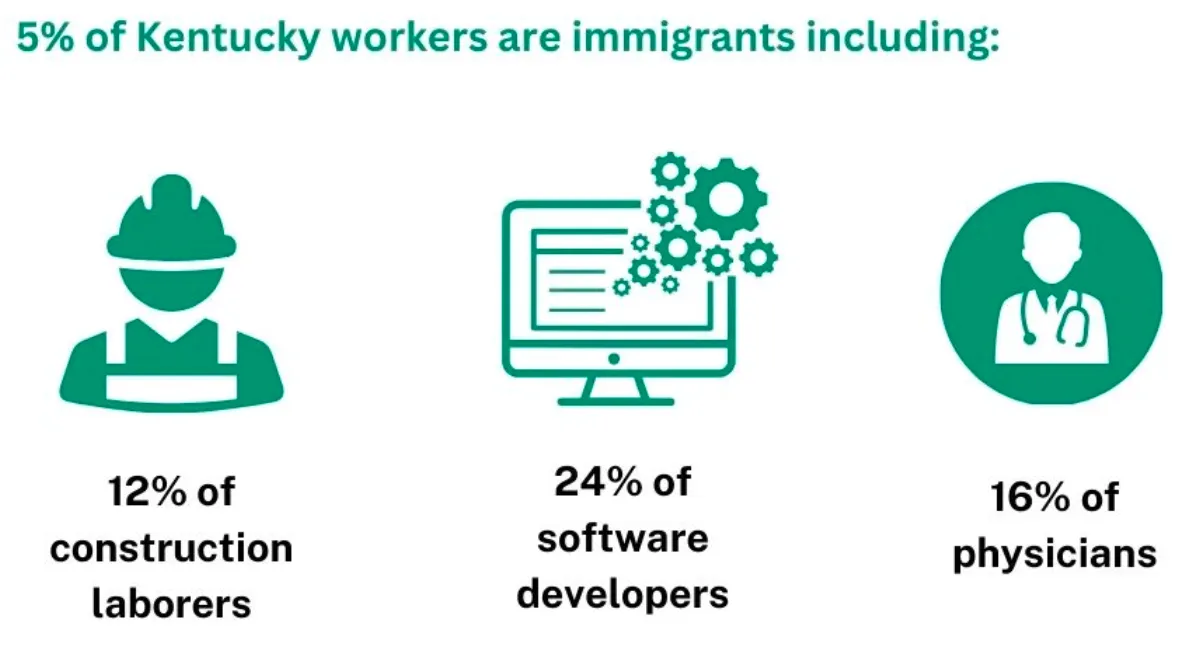Table of Contents
As 2019 begins, 19 states are raising their minimum wages, and several more are scheduled to raise them later this year. Many of these states already have minimum wages above the federal level of $7.25 and are undergoing their second or third round of wage increases.
This leaves 21 states, including Kentucky, with a minimum wage of $7.25, and leaves workers in those states struggling to get by. No one deserves to live in poverty whether they are employed or not. Still, someone working full time at minimum wage is considered below the poverty level for a family of two, and nowhere in the country is the minimum wage enough to afford a two bedroom apartment.
Someone working full time at minimum wage is below the poverty level for a family of two, and nowhere in the country is the minimum wage enough to afford a two bedroom apartment. #RaiseTheWageKYClick To TweetThe problem of low wages is especially relevant in Kentucky. At 4.4%, we had the highest level of workers earning the federal minimum wage in 2017. We also had the highest two-year average, showing this is not a temporary issue.
Kentucky has the HIGHEST level of minimum-wage workers in the entire country. #RaiseTheWageKYClick To TweetRaising the minimum wage would help Kentucky more than any other state. It’s long past time for us to do something about this.
Benefits of higher wages
Many of the benefits of raising the minimum wage are obvious. Putting more money in the hands of workers and families who need it and who have earned it will improve their lives and the health of our country and economy.
But looking more closely, raising the minimum wage would have even more positive outcomes for certain groups. A higher wage would especially benefit women and minorities, who are more likely to work in low-wage positions. This is especially true in Kentucky, where women are much more likely than men to make the minimum wage or less.
It would also raise the wages of the parents of 19 million children. This again would benefit Kentucky more than most states, as we have the fourth highest child poverty rate in the country (25%).
An increase in the minimum wage would also help a larger number of workers than many believe. Contrary to stereotypes, most minimum wage workers are older than 24, and 30% of all workers in the US are “near minimum wage,” making more than $7.25 an hour, but not much more. An increase is likely to help them as well.
Most minimum-wage workers are older than 24, and 30% of ALL workers are 'near minimum wage.' Raising the minimum wage would help ALL of them. #RaiseTheWageKYClick To TweetBeyond strictly looking at income, increases to the minimum wage have been linked to improvements in infant health, mental health, and reductions in the crime rate.
The minimum wage as economic development
Raising the minimum wage can also be seen as a part of a broader economic development strategy. Many regions in the state have had trouble replacing lower-paying jobs with higher-paying ones. Rather than trying to bring in or bring back higher-paying jobs, one solution would be to simply turn existing low paying positions into better ones. This route has promise, as it has been effective in the past.
Manufacturing, nostalgically held up as an example of a good employment opportunity, was not always a source of good jobs. In fact, manufacturing jobs were downright awful until unions and regulations improved the salaries and working conditions in factories. There is nothing keeping low-paying service positions from experiencing the same level of improvement.
Even if Kentucky saw a dramatic influx of new high-paying positions, improving these lower-paying jobs would still be important. Economic mobility is “sticky,” with low-wage workers more likely to become unemployed than move up the economic ladder. And our state has a very high rate of these low-wage positions.
There is no requirement that low-paying jobs must remain low-paying. Raising the minimum wage would improve economic prospects for many areas of the state. This should be part of any economic development strategy going forward.
Concerns and responses
Still, many have concerns about what the effect of such raises would be. The economic argument against raising the minimum wage is that it makes labor more expensive, causing businesses to purchase less of it, leading to higher unemployment. This argument is overly simplistic.
Despite the theory and scare tactics, in study after study, the evidence shows no discernible job losses due to increases in the minimum wage. (Links here, and here, and here, and here, and here, and here, and here.)
Paying workers more improves job satisfaction, decreases turnover, and improves customer service. This cuts down on recruitment and training costs and ensures you have more productive employees. The increased cost of labor is worth it.
Furthermore, keeping wages low doesn’t make our state more competitive. We have the same minimum wage as Tennessee and Indiana, giving us no real advantage. And our wage is lower than states like Illinois and West Virginia, which could attract workers away from our state. How business friendly will we be if no one wants to work here?
Others have pointed out that if wages go up, employers will shift the cost onto consumers. But we as a society are already paying the price for these low wages, spending $153 billion in public assistance each year, most of which goes to working families. We’re essentially paying higher taxes so businesses can pay lower wages.
People think if wages go up, costs will shift to consumers. But we are already paying for low wages, spending $153 billion in public assistance each year. ➡️We’re essentially paying higher taxes so businesses can pay lower wages. #RaiseTheWageKYClick To TweetSome would argue that an area’s economic struggles are a reason to avoid wage hikes. In this line of thinking, New York and Seattle can raise their minimum wages because their economies are bigger and can better afford it.
But areas should raise their minimum wages precisely because of these struggles. As lower-income workers’ wages rise, so does their ability to spend, helping to grow the economy and draw in new businesses looking for a share of this new disposable income. It’s not that we can’t afford to do it –it’s that we can’t afford not to.
What is Kentucky doing?
Multiple attempts to raise the state’s minimum wage have failed in previous years. Attempts by Louisville and Lexington to raise the minimum wage at the local level were struck down by the state Supreme Court.
Still, some lawmakers are trying to increase the minimum wage despite setbacks in the past. Senator Reggie Thomas of Lexington has pre-filed a bill which would raise our state’s minimum wage to $15 by 2026 in roughly one dollar annual increments. This would be an important step in the right direction and would be roughly on par with many other states which have increased wages.
The proposed legislation is also interesting in its inclusion of an anti-preemption measure, which would allow local governments to set their own minimum wage levels in excess of the state level.
Going forward
As of now, it does not seem likely that Sen. Thomas’s bill will gain much traction, much less pass or be signed into law.
Still, it is important to keep such legislation at the forefront of policy discussions. It is, after all, an election year in Kentucky, and it has yet to be seen what sort of issues will come up on the campaign trail. Minimum wage increases are enormously popular, and it wouldn’t surprise me to see all of the Democratic candidates and even a Republican candidate take up the issue to try and capitalize on such a broadly favored policy.
Getting such a bill passed would be an important first step, but we cannot see any single wage level as an end goal. If we do, we run the risk of allowing wages to stagnate for another decade.
Because of this, most states which have increased their minimum wage have also included a way to factor in changes in the Consumer Price Index. This allows for continued increases in the minimum wage to make up for increases to the cost of living. This sort of indexing would significantly strengthen the policy for the future.
A policy like this should not scare us. The economy is more productive than ever, so we are better able to handle wage increases than we once were.
We are also better able to handle this politically. A majority of the country supports not just raising the minimum wage, but raising it to $15. There is little to fear from supporting a raise.
The minimum wage needs to be raised quickly and significantly, and nowhere would benefit as much from an increase as Kentucky. People have been working for too little for too long; it’s time our leaders stepped up and did the right thing for Kentucky workers.
The minimum wage needs to be raised significantly, and no other state would benefit as much from it as KY. People have worked for too little for too long; it’s time our leaders stepped up and did the right thing for KY workers. #RaiseTheWageKYClick To Tweet–30–







